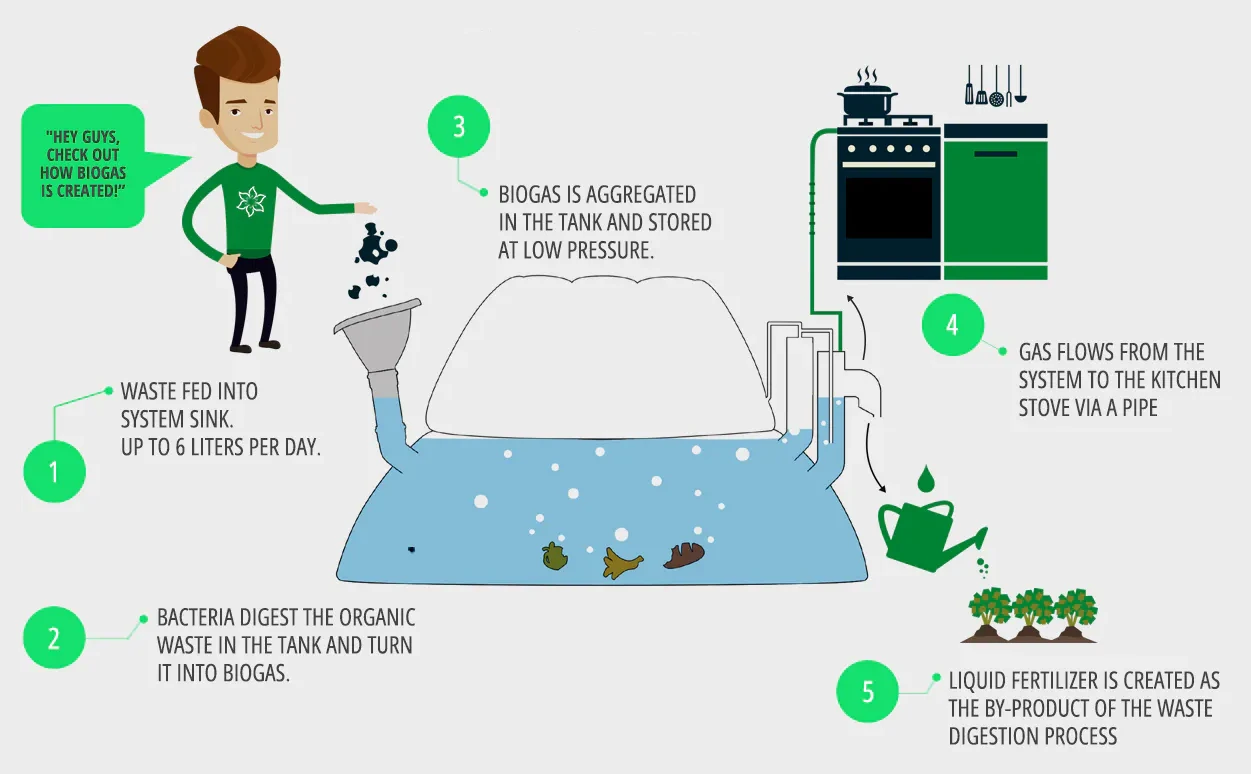In a world increasingly focused on sustainability and ecological preservation, the concept of a home biogas plant stands out as a shining example of innovative, environmentally friendly living. This ingenious system offers a dual benefit: it’s a highly effective method for managing organic household waste while simultaneously providing a renewable source of energy.
This article delves into the world of home biogas plants, detailing their functionality, benefits, and the straightforward steps you can take to integrate this green technology into your daily life, thereby contributing to a more sustainable and self-reliant lifestyle.
Before we get started, let me be very clear… if you don’t have livestock or a lot of green waste, your biogas system is not going to pay for itself! It will, however, reduce your energy needs and help you live a comfortable, more sustainable lifestyle.
Understanding Home Biogas Plants
A home biogas plant is a compact, yet powerful system designed to turn everyday kitchen leftovers and garden debris into biogas, a renewable and versatile energy source. This biogas can be utilized in various ways, such as for cooking, heating your home, or even generating electricity, offering a sustainable and eco-friendly alternative to conventional energy resources.
How It Works
The secret behind a home biogas plant is its anaerobic digestion process. This process involves microorganisms breaking down organic matter in an environment devoid of oxygen. The result? The production of biogas. The essential components of this system include a sealed digester tank, an inlet for feeding in organic waste, and an outlet from which biogas is collected. This system is a model of efficiency, recycling organic waste and converting it into valuable biogas.
Biogas Explainer Video
The Advantages of a Home Biogas Plant
- Effective Waste Management: With a home biogas plant, kitchen scraps and garden waste are no longer a disposal headache but valuable resources. This reduces landfill waste, contributing to a cleaner, healthier environment.
- Sustainable Energy Source: Biogas is a clean, renewable form of energy. It offers a variety of uses, from cooking to heating, and even electricity generation, cutting down on fossil fuel dependence.
- Cost-Effective: Producing your own biogas can lead to significant savings on energy expenses, lowering your utility bills over time.
- Reduced Carbon Footprint: Opting for biogas over fossil fuels greatly diminishes your household’s carbon emissions, fostering a more eco-friendly home.
A home biogas plant isn’t just a personal energy solution; it’s a step towards global environmental sustainability. By converting organic waste into biogas, these systems help reduce methane emissions from landfills, a significant greenhouse gas contributor.
Additionally, by diminishing our reliance on fossil fuels, we actively participate in reducing the overall carbon footprint, crucial in combating climate change.

Moreover, for those living in areas without reliable waste management services, a home biogas plant can be a game-changer, turning a waste problem into an energy solution. It fosters a deeper connection with the cycle of consumption and disposal, encouraging a more conscious and responsible lifestyle.
More To Discover
- Researchers Craft Sustainable Bioplastic Pellets From Eggshells to Replace Plastic
- Geothermal Drilling Speeds Up by 70%, Costs Slashed by Half Since 2022
- 8 Unexpected Ways to Decarbonize the Shipping Industry Immediately
- Revolutionizing Fabric Recycling: New Method From Denmark Could Transform the Clothing Industry
Setting Up Your Biogas Plant
Implementing a home biogas plant might seem daunting, but it’s made simpler with the availability of DIY kits and professional installation services. These kits are designed for user-friendly installation and upkeep, making them accessible even to those new to biogas technology. Start by collecting and depositing organic waste like kitchen leftovers and garden trimmings into the digester. In return, you’ll receive a continuous supply of renewable energy.
Conclusion
A home biogas plant is more than just a tool for energy generation; it’s a symbol of a proactive, environmentally conscious approach to living. Whether driven by the desire for cost savings, environmental responsibility, or a quest for self-sufficiency, incorporating a biogas plant into your home is a smart, future-oriented decision. As we collectively stride towards a greener, more sustainable future, the adoption of home biogas plants could play a crucial role in shaping a more ecologically balanced world.




















